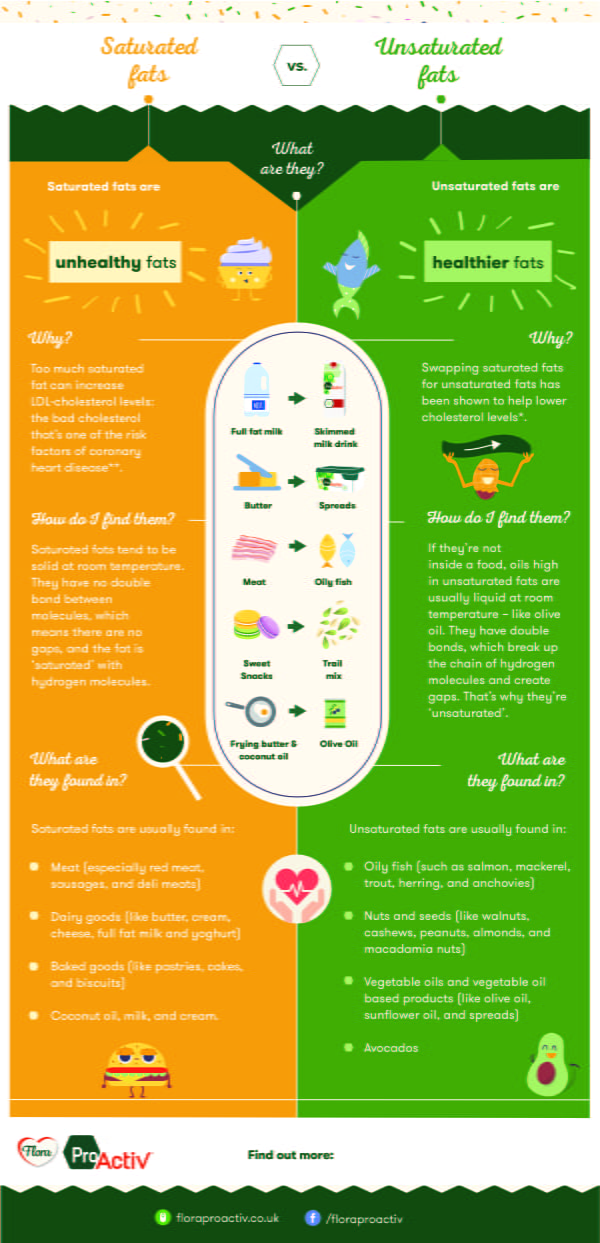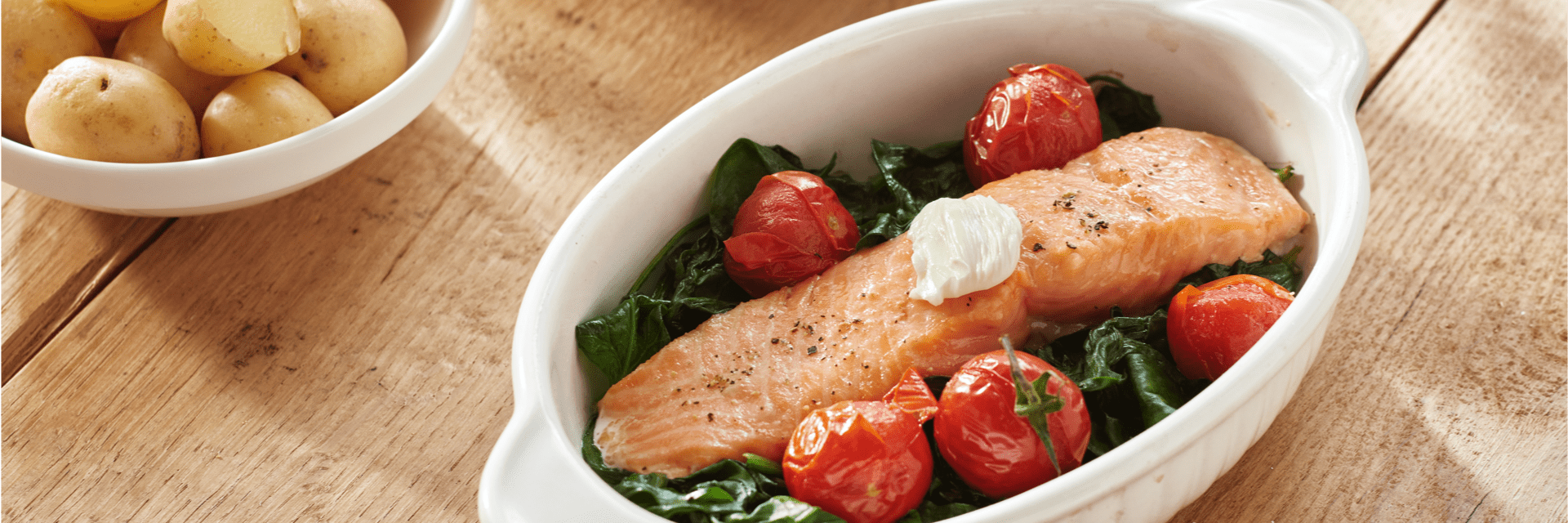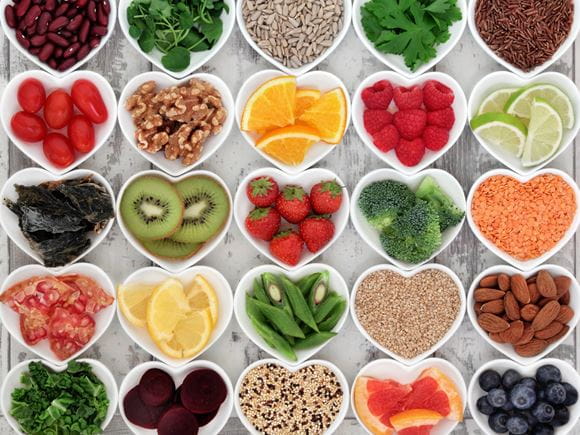While fat in general plays an important part in a healthy diet, the kind of fat in your food – either saturated or unsaturated fat – is something to consider when preparing snacks and meals.
Saturated and unsaturated fats are present in many of the foods we eat. Understanding the differences between the two types, which foods are the main sources, and the potential impact of these fats on health can help you make better choices as you cook and shop.
What are saturated and unsaturated fats?
Saturated and unsaturated fats are different kinds of fat, found in different amounts in different foods. While full fat dairy products such as butter and cheese and fatty and processed meats (as well as many baked and processed foods like cakes and biscuits) are high in saturated fat, good sources of unsaturated fats include nuts, seeds, and vegetable oils*.
One of the most relevant aspects of the difference between these types of fat is in the impact they can have on health.
Saturated vs. unsaturated fat
Replacing saturated fats with unsaturated fats in the diet has been shown to lower blood cholesterol – one of the risk factors in the development of heart disease**. In the UK on average we currently eat more saturated fat than is recommended.
So paying attention to the amount of saturated fat vs. unsaturated fat in your diet, and opting for unsaturated options where possible, is a positive step for heart health**.
Here’s an infographic to help you understand better the difference between saturated and unsaturated fats:

What is the difference between saturated and unsaturated fats?
So what are saturated and unsaturated fats, structurally speaking? The difference between saturated and unsaturated fat lies in the number of double bonds in the fatty acid chain. Saturated fatty acids lack double bonds between the individual carbon atoms, while in unsaturated fatty acids there is at least one double bond in the fatty acid chain.
Saturated fats tend to be solid at room temperature and from animal sources, while unsaturated fats are usually liquid and from plant sources.
Saturated fat and unsaturated fat: Making changes to your diet
- Know the guidelines for the recommended maximum amount of total fat, and the maximum amount that can be saturated. According to the NHS website, the current recommendation on fat for adults equates to a maximum of around 70g of fat a day, of which no more than 20g should be saturated.
- Read nutritional labels, such as the reference intake (RI) information on the front of packets, to find out how much saturated fat is in foods. A lot of prepared foods have a label on the front of pack indicating the quantity of fat per portion, and the proportion of that amount that includes saturates. These can help guide your food choices throughout the day and help you choose foods that are lower in saturated fat.
- Reduce the amount of saturated fat in your diet and replace with some unsaturated fats. To help reduce your intake of saturated fat, you can limit foods that are high in saturated fat, like cakes, pastries and chocolate. You can also choose lower fat alternatives for dairy products like swapping full fat milk for lower fat milks or swap butter for reduced fat spreads. As for fatty meat and meat products, you could exchange these for poultry like chicken or turkey without the skin or for lean cuts of meat, which are lower in saturated fat. You can find more ideas to help you reduce the saturated fat in your diet in our simple swaps.
- Eat more unsaturated fat…
Nuts and seeds, as well as vegetable oils and spreads, are a good source of unsaturated fat – consider adding about a tablespoon of nuts and seeds as a topping for cereal, salads or porridge, or even enjoying them as a snack.
So, if you want to work on your cholesterol levels, swapping saturated fats for some unsaturated fats is a good way to start. Why not download our Cholesterol Lowering Starter Kit and make a start today?
* Unsaturated vegetable oils include rapeseed, olive and sunflower oil, but do not include palm or coconut oil.
**Replacing saturated fats with unsaturated fats in the diet has been shown to lower blood cholesterol***.
***High cholesterol is a risk factor in the development of coronary heart disease. There are many risk factors for coronary heart disease and it is important to take care of all of them to reduce the overall risk of it.
Key references
- Scientific Advisory Committee on Nutrition (2018). Draft report: Saturated Fats and Health. (accessed 16 May 2019).
- Hooper L et al. (2015) Reduction in saturated fat intake for cardiovascular disease. Cochrane Database of Systematic Reviews(6)
- Roberts, C., Steer, T., Maplethorpe, N. et al.(2018). National Diet and Nutrition Survey Results from Years 7 and 8 (combined) of the Rolling Programme (2014/2015–2015/2016). London: Department of Health and Food Standards Agency.
- European Commission (2016) EU register on nutrition and health claims. (accessed 16 May 2019).
- NHS (2017) Fat: The Facts. (accessed 16 May 2019)
- Stanner S & Coe S (2019) Cardiovascular Disease: Diet, Nutrition and Emerging Risk Factors, 2nd Edition, Keith N Frayn, Chair.Wiley-Blackwell: Oxford, UK.
The British Nutrition Foundation has reviewed the accuracy of the scientific content of this page in May 2019 (please note this does not include linked pages). The Foundation does not endorse any brands or products. For more information about the Foundation, please visit www.nutrition.org.uk
This information has been included in good faith, but is for general informational purposes only, and should not be construed as a guarantee. The nutritional facts and statements on this site are designed for educational and resource purpose sonly, not being substitutes for professional advice. If you have any concerns or questions about your health, you should always check with your GP or healthcare professional.
Lower your cholesterol in 21 days
Do you have high cholesterol? Sign up now to get our free cholesterol lowering guide, with everything you need to take down your cholesterol in just 21 days.


